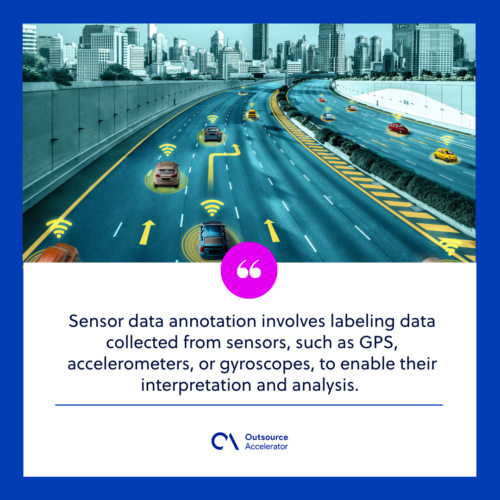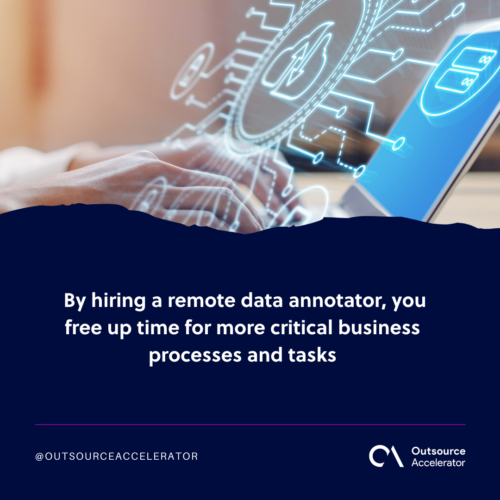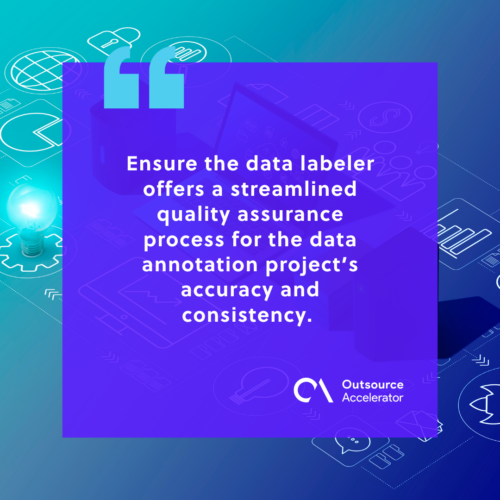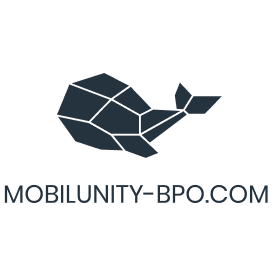7 reasons why your ML company should outsource data annotation

This article is a submission by Mobilunity BPO. Mobilunity BPO is among the leaders in sourcing, hiring, and retaining top Ukrainian talents for businesses worldwide.
With the significant growth of AI and ML, data annotation — aka data labeling — has emerged as an indispensable tool for extracting valuable insights from complex datasets.
Providing the labeled data for training machine learning models drives companies’ digital transformation, business process automation, and other innovative projects.
Don’t let your business fall behind the curve by implementing artificial intelligence and machine learning with comprehensive data annotation services.
Here are some eye-opening stats that’ll make you want to do so right away:
- Statista predicts that the global AI market will skyrocket from $208 billion in 2023 to nearly $2 trillion in 2030.
- Following Fortune Business Insights, the global ML market will surpass $209 billion in 2029, expanding from $21 billion in 2022.
- MarketsandMarkets states that the digital transformation industry, propelled by AI and ML adoption, will grow from $594 billion in 2022 to over $1.5 trillion in 2027.
But how can you streamline your data annotation to implement AI and machine learning? Generally, you have two options:
- Hire in-house data labelers
- Outsource data annotation services
Today, we’ll discuss the second approach and explain how it outperforms the traditional (in-house) one.
Types of ML data annotation
When implementing AI and ML, data annotation is an absolute must. It’s a crucial tool that helps prepare high-quality, labeled, and classified datasets for machine learning.
Here are some of the most common data annotation types you may require in your project:
Image annotation
It involves labeling images with bounding boxes, polygons, or points to identify objects, shapes, or regions of interest.
Some use cases of this annotation type include object detection, facial recognition, and self-driving cars.
Video annotation
It involves labeling video data with tags or categories to identify objects, actions, or events.
Companies opt for video annotation outsourcing to apply it in video surveillance, activity recognition, and autonomous vehicles.
Text annotation
It involves labeling text datasets to extract meaningful information. The most common application of this annotation type is natural language processing, including sentiment analysis, text classification, and named entity recognition.
Audio annotation
It involves labeling audio data to identify speech or other sounds. This annotation type is widely used in speech recognition solutions like virtual assistants, voice commands, and transcription services.
Sensor data annotation
It involves labeling data collected from sensors, such as GPS, accelerometers, or gyroscopes, to enable their interpretation and analysis. This annotation type is common in health and environmental monitoring.
We listed the most prevalent types of data annotation. Understanding each will help you build effective machine learning models for your specific tasks.

Top 7 reasons to outsource data annotation
Let’s now discuss the core matter of our post. Why should you outsource data tagging? You can rely on at least the following seven reasons:
1. High-quality datasets
Data labeling outsourcing allows you to leverage the expertise of skilled professionals, ultimately getting high-quality datasets.
These experts typically have experience in providing services beyond data annotation, such as quality assurance and validation, ensuring that the labeled data is accurate and consistent.
2. Scalability and timely delivery
Sometimes data annotation can be time-consuming and require significant resources. Outsourcing this service allows you to scale up or down quickly and easily based on your needs.
This way, you also ensure your projects are completed within the desired turnaround time and with the right outsourcing partner.
3. Data security
Security may become a critical concern in your data annotation project, especially when dealing with sensitive data like personal information or trade secrets.
Outsourcing data labeling to a trusted partner provides additional security measures and confidentiality agreements to protect your datasets from unauthorized access, theft, or misuse.
4. Talent availability
When you outsource data labeling for machine learning, you access a vast talent pool with the necessary skills and expertise for your particular project and niche.
It means you can find talent quickly, meet deadlines, and achieve your goals.
5. Internal bias mitigation
In-house data annotation is often subject to biasing due to the familiarity of the internal team with the data.
Your current employees may have a predetermined expectation of how an ML model must behave, providing unsuitable labels to the datasets. Outsourcing your data annotation processes helps mitigate this issue and get a fresh perspective on your data.
6. Cost savings
Outsourcing data annotation is a cost-effective solution. It eliminates the need to hire and train in-house data labelers, invest in expensive tools and equipment, and maintain a dedicated infrastructure for your projects.
On top of that, you may look for third-party service providers within specific locations with salary rates that fit your budget.
7. Focus on core business
Last but not least, by hiring a remote data annotator, you free up time for more critical business processes and tasks.
You can hop on your product development, marketing, and other activities, while the outsourcing company will label the data for you.

How to choose a trustworthy data annotation service provider?
Now that you know the reasons to outsource data annotation, you probably wonder how to find a reliable data labeling specialist.
Here are some tips to help you with that:
- Look for a provider with expertise in your domain and the required data annotation type(s). Don’t forget to verify their experience, credentials, and customer reviews to ensure they have relevant knowledge and skills.
- Ensure the data labeler offers a streamlined quality assurance process for the data annotation project’s accuracy and consistency. You can ask for their work examples and check the labeled datasets’ quality.
- Ensure your service provider has the infrastructure, tools, and workforce to handle large volumes of data annotation tasks. This way, you’ll determine whether the labeler has enough resources to satisfy your scaling needs.
- Choose a provider with robust data security measures, typically including encryption, secure data transfer, and access controls.
- Compare pricing models and services different data annotation providers deliver to find the best value for your money.
- Ensure the data annotator has effective communication channels, such as project management tools, email, and phone support, to update you on project progress and address any concerns timely.
- Look for providers who offer flexible solutions and can customize their services to meet your unique data annotation requirements.
- Look for a data labeler who uses innovative data annotation techniques, such as active learning, to reduce the labeled data needed to train ML models.
- Give preference to an outsourced vendor who offers additional services, like data preprocessing, data validation, and model training, to provide a complete end-to-end solution.
Keep the above tips in mind, and you’ll undoubtedly find the best data annotation vendor for your project.

Outsource data annotation: In conclusion
Outsourcing data annotation can benefit businesses of all sizes. It’s a way to stay ahead of the competition and drive your company’s AI and ML adoption along with digital transformation.
We hope today’s top reasons have convinced you to outsource data annotation to a third-party provider. Leverage the tips for finding one to get high-quality datasets and save time, money, and resources.







 Independent
Independent




